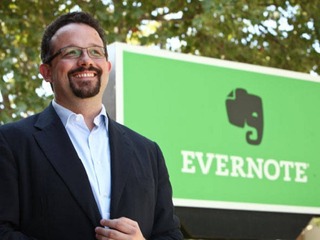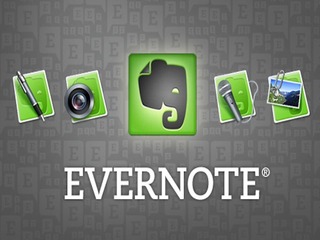
Phil Libin on an Evernote IPO: It's a moral obligation
Evernote CEO talks about building Evernote and where he sees the company going

There are so many apps that come out these days that it is hard to keep track. Many of them do serve a function, and there are plenty that are, frankly, useless. Few, I think, have the lofty goals of archiving and note taking app Evernote, which is really designed to change the way users live their lives.
Evernote is a company that is designed to organize your entire life, from the food you love and the people you meet, to the things you see online. Their slogan is "Remember everything" and that is really what they want their users to do.
I recently spoke to CEO Phil Libin about what lessons he brought to the company, what he sees as the future of note taking and when he is finally going to take his company public.
Note: Libin will be one of the Keynote speakers at the upcoming Vator Splash event in San Francisco on Feb. 13. Register here. Splash keynotes are TED-like presentations from seasoned and high-profile high-tech entrepreneurs, who share their lessons starting, building and scaling their startups. All speakers either founded a company that has IPO'd, sold for several hundred million dollars or is currently valued at more than $500 million. Past speakers include Peter Thiel, Tony Hsieh (Zappos), Dick Costolo (Twitter), Tim Westergren (Pandora), Aaron Levie (Box) and many more. Check out their invaluable lessons here at the Splash Keynote archives.
Libin founded the Redwood City-based Evernote in 2008. Since then the company has raised nearly $251 million, including a $70 million Series D round of funding at a $1 billion valuation in May 2012.
In April 2011, Libin told Vator CEO Bambi Francisco that Evernote was generating $1 million a month, a number that Libin says has doubled or tripled since then. For the past four years, Evernote has seen its revenue triple year-to-year.
The company's entire customer base of around 48 million is made up of individuals, most of whom are business professionals. The company announcedd its business product in August 2012, and launched it in Decemeber.
Going public
With all of that growth, the possibility of Evernote going public has been floated many times. In August, though, it was reported that Evernote was going to be delaying its IPO until 2015, at the earliest, and in a recent blogpost Libin said that Evernote has no exit strategy. So what's the deal?
Admitting that there had "been a lot of confusion" over the company's IPO, Libin insists that he "tried to be consistent" about what he had said about it.
"Being public isn't an end and it can be highly disruptive," Libin said, noting that he wants to take the company public eventually, but he doesn't want to rush into it. He says that he plans to take the next few years to "experiment", now that he has "the resources to take risks."
He reiterated the plan to go public in 2015 or 2016 at the earliest, since "by then the markets will have settled down and made peace with technology companies."
In recent years, Libin told me, there has been a struggle between the public markets and the technology companies. Technology companies have to take long-term views, years ahead in some cases, while the markets react to things within seconds, buying and selling based on rumors. This is a recent problem, one that is "not good for anyone" and is bad for innovation. But it is also one that Libin believes will correct itself eventually.
And, of course there are also good aspects to being a public company, including the fact that it allows the people who have a real stake in the company: the people who use the service, to become the owners of the company.
Many companies see going public "as a way to cash out," Libin said, but he takes it much more seriously. It goes back to what Libin says is the entire philosophy behind Evernote: "To be a 100 year startup. To create a company that people are still in love with 100 years from now." (Maybe the company should change its name to Forevernote.)
"A lot of people don't walk about this, but it's simply the right thing to do," Libin said. "It is morally correct to be public at some point."
Lessons learned
Libin says that he has absolutely no plans to sell the company, having already sold the first two companies he founded. His first company, Engine 5, a leading Boston-based Internet software development company, was acquired by Vignette Corporation (VIGN) in 2000. His second company, CoreStreet, a provider of smart credential and identity management technologies to governments and large corporations throughout the world, was acquired by ActivIdentity (ACTI) in 2009.
Those two companies were built for someone else, he said, but he decided to build Evernote for people like him.
"We wanted to build a company we wanted to keep," he said.
Looking back on when he first started Evernote, Libin says that he took bets early on that came out well, including betting on smartphones, mobile, tablets and app stores.
He did underestimate, though, how difficult it would be to make Evernote simple, especially on mobile where simplicility is so important since "the tolerance for inelegance and inefficiency is so much lower than it is on the desktop."
Apps live or die on word of mouth, he said, and since the session length on mobile is so short, if the quality is not good enough then it simply cannot be saved.
"When the hardware is ugly, the software doesn't matter."
And, of course, Libin also admits to taking some bad bets, including developing for platforms that did not work out, such as Palm Pre and Symbian, but also says that he set out to develop for every platform knowing that some would fail, and that this ultimately helped the company in the end.
"I did a lot more wrong than right," he said, but being agile, and being able to see his mistakes, allowed the company to ultimately be successful.
When asked about competition, Libin says that he does not look at other services, unless he is working with them, and that he does not have a competitive mindset.
"You succeed by having a good product," he said, not be focusing on what other people are doing.
As for what people did before Evernote came along, he told me that, "people were leading a miserable, disorganized life."
"They weren't doing anything before Evernote organized their lives."
The future for Evernote
Right now Evernote makes money by selling its premium service for an annual or monthly fee, but Libin sees a large amount of profit for Evernote coming from people being able to buy products from them.
In August, Evernote partnered with Moleskine to create “smart notebooks.” There was a large and a pocket-size to allow user to write something out by hand, snap a picture of it with their phone, and have the note automatically digitized.
Libin sees a whole line of products offered by Evernote in the future, including scanners and smartpens. He even sees Evernote integrating with a product along the lines of Google Glasses, where users would wear something that would give them access to their info at all times.
"Five years ago it was all PCs," he said. "Then it went to phones then to tablets." So Evernote has to look closely at everything to see what is coming up next. The goal of the company, he said, it to "become ubiquitous, meaning that Evernote becomes part of the business."
There is also Evernote's recent launch of its business product, who use it to collect and capture information, and then use it to collaborate with small groups.
The company's core customers are information professionals, mostly from small and medium sized businesses. They exist in every industry, Libin said, from architecture to mining.
"Every industry has become a knowledge industry."
A lesson from Steve Ballmer
Toward the end of our interview, Libin shared a piece of advice with me that he once got from Steve Ballmer, CEO of Microsoft: you will only know around 100 people in your entire lifespan, and once its filled up you aren't going to know any more people. So don't waste slots on people who aren't doing anything.
"Ballmer may have filled up his quota, but I haven't filled out my 100 yet," Libin said, "and I don't want to squander them."
Note: Libin will be one of the Keynote speakers at the upcoming Vator Splash event in San Francisco on Feb. 13. Register here. Splash keynotes are TED-like presentations from seasoned and high-profile high-tech entrepreneurs, who share their lessons starting, building and scaling their startups. All speakers either founded a company that has IPO'd, sold for several hundred million dollars or is currently valued at more than $500 million. Past speakers include Peter Thiel, Tony Hsieh (Zappos), Dick Costolo (Twitter), Tim Westergren (Pandora), Aaron Levie (Box) and many more. Check out their invaluable lessons here.Splash Keynote archives.
(Image source: https://gigaom.com)
Related Companies, Investors, and Entrepreneurs
Evernote
Startup/Business
Joined Vator on
Our goal at Evernote is to give everyone the ability to easily capture any moment, idea, inspiration, or experience whenever they want using whichever device or platform they find most convenient, and then to make all of that information easy to find.
And we’ve done just that. From creating text and ink notes, to snapshots of whiteboards and wine labels, to clips of webpages, Evernote users can capture anything from their real and digital lives and find it all anytime.
Evernote is an independent, privately held company headquartered in Mountain View, California. Major investors include Sequoia Capital, Morgenthaler Ventures, Troika Dialog, and DOCOMO Capital.

Phil Libin
Joined Vator on
Related News


Evernote - the latest company to delay IPO

Evernote driving $1 million a month in sales

